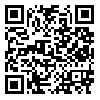

BibTeX | RIS | EndNote | Medlars | ProCite | Reference Manager | RefWorks
Send citation to:
URL: http://imtj.gmu.ac.ir/article-1-991-en.html

 1, Hosain Khakpour2
1, Hosain Khakpour2 
 , Mohammad Mojtaba Keikhay Farzaneh3
, Mohammad Mojtaba Keikhay Farzaneh3 
 , Javad Khalatbari4
, Javad Khalatbari4 

2- Department of Quran & Hadith Sciences, Faculty of Literature & Human Sciences, University of Sistan and Baluchestan, Zahedan, Iran
3- Department of Psychology, Faculty of Psychology & Education, Zahedan Branch, Islamic Azad University, Zahedan, Iran
4- Department of Psychology, Psychology and Education, Ramsar Branch, Islamic Azad University, Ramsar, Iran
Aims: Self-esteem originates from the social life and its values and it is among the most important aspects of personality and indicator of human behavioral characteristics. Cognitive-behavioral approach is a short-term and focused approach for assisting individuals with drug abuse. The objective of this study was to investigate the effect of cognitive-behavioral group therapy on self-esteem and the attitude of addicted people toward drugs.
Methods: In this semi-experimental study with control group and pretest-posttest design, 20 subjects were selected from among the 48 men who referred for the first time to four private centers for addiction abandonment in Zahedan, and were divided into two experimental and control groups, each includes 10 subjects. Experimental group received 12 sessions of 1.5-hour cognitive-behavioral group therapy, and control group received no treatment. Data collection tool was two questionnaires including Coopersmith self-esteem inventory and Attitude Scale Questionnaire concerning the attitude toward addiction and narcotic drugs. To analyze the collected data, ANCOVA analysis was utilized using SPSS 16 software.
Results: The pretest score difference of the two groups as well as the pretest and posttest score of the control group was not significant in terms of self-esteem index (p>0.05). However, the difference in the score of the two phases of the test in the experimental group was significant (p=0.023). The pretest score difference of the two groups as well as the pretest and posttest score of the control group was not significant in terms of attitude toward drugs index (p>0.05). However, the difference in the score of the two phases of the test in the experimental group was significant (p=0.03).
Conclusion: Cognitive-behavioral group therapy leads to an increase in self-esteem and negative attitude toward drugs in the addicted individuals.
Received: 2011/01/9 | Accepted: 2013/05/5 | Published: 2013/05/5
| Rights and permissions | |
 |
This work is licensed under a Creative Commons Attribution-NonCommercial 4.0 International License. |
